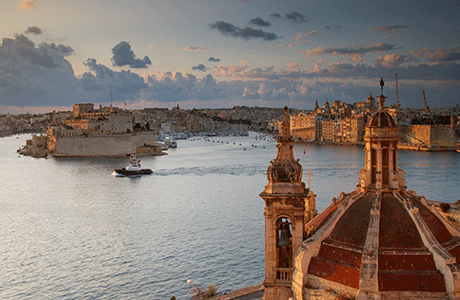Following EU accession in 2004, Malta has witnessed a steady— if slow—influx of captive insurance companies and developed a reputation as an up-and-coming European destination.
Following EU accession in 2004, Malta has witnessed a steady— if slow—influx of captive insurance companies and developed a reputation as an up-and-coming European destination.
As of March this year, Malta is home to 11 captive insurance companies—also known as affiliated insurance companies in Maltese law—according to Malta Financial Services Authority (MFSA) statistics.
Matthew Bianchi, partner at GANADO Advocates, says that the Maltese insurance industry in general has been rapidly growing since the early 1990s.
“There has long been political awareness that financial services (including the insurance industry) should be one of the pillars of Malta’s economy. The financial services sector now accounts for circa 12 percent of Malta’s gross domestic product.”
With financial services firmly engrained in the ethos of the economy, Malta is serious about competing in the space. Robert Aquilina, head of the communications unit at the MFSA, thinks that Malta’s recent success is also due to a sound regulatory and legal system and an attractive tax scheme.
He adds: “[Malta’s] ongoing success is due to adopting innovative and proactive legislation whilst maintaining high regulation standards.”
Bianchi also highlights that Malta is the only full EU member state to offer protected cell company (PCC) and incorporate cell company (ICC) legislation, as well as an extensive double taxation treaty network covering more than 60 countries.
“Malta’s re-domiciliation regulations also allow captives to seamlessly transfer its seat to or out of Malta, without any break in the company’s corporate existence or the need to re-execute any insurance policies or other contracts.”
Big hitters
John Tortell, vice president at USA Risk Group in Malta, says that warranty business has proved to be a popular line for the island’s insurers.
Malta is also the domicile of choice for the captives of big name companies such as Vodafone, Peugeot and Renault. According to Bianchi, the island is consistently leading as one of the most cost-efficient domiciles for captives.
He says that Malta’s proximity to mainland Europe and the GMT timezone are added benefits. “Malta provides captives with top professional services as most of the top international insurance managers have all been established in Malta since EU accession.”
Aquilina also stresses the selection of vehicles that captives in Malta can choose from. He explains that a captive can operate as a direct insurance company, whereby it issues policies to subsidiaries in a group, or it may serve as a reinsurance company, where it assumes risks behind commercial insurers.
He says: “The captive solution in Malta may be taken as a standalone company form or as a cell in the structure of PCCs or ICCs. PCCs segregate assets and liabilities permitting a greater level of management control and reduced operational costs.”
“An advantage to the owner of a PCC is that a cell writing insurance business can use the core non-cellular capital of the PCC to satisfy minimum guarantee fund requirements and capital requirements as envisaged by EU directives. Whereas ICCs have distinct cells each with separate juridical personality, thus reducing legal complexities. They also offer an alternative risk management structure with advantages relating to potential cost savings due to pooling of resources.”
Aquilina believes that PCC and ICC vehicles attract captives to Malta, as it is one of the very few EU member states that allow such structures.
You are what you are
Although Europe as a whole is lagging behind the likes of the US and the Caribbean in terms of captive business, Aquilina predicts that its countries will increase their appreciation of the captive vehicle as the world becomes more aware of risk.
He says: “Continental European [domiciles] will increasingly appreciate the use of captives and other risk transfer vehicles in a world which is increasingly becoming conscious about risk prevention and mitigations as well as the increasing costs associated with the management of risk.”
At the country level, companies have a lot of choice in Europe and could be forgiven for overlooking Malta in favour of the more established European domiciles such as Luxembourg and Guernsey. But Bianchi feels that companies should reach out to the island as its regulatory regime recognises the particular nature of captives.
“Captives are allowed a fast-track licensing process and as Malta is a full EU member state captives established in Malta may write business directly throughout the EU by passporting its services into all other EU member states.”
Taking the lead
With the implementation of the Solvency II Directive looming, the likes of Malta are pushing forward with the regulation.
Explaining the MFSA’s dedication to the cause, Bianchi says: “It has set-out the ground-work to best prepare re/insurance undertakings and captives for the full implementation of the Solvency II Directive in due course. The MFSA has issued a number of guidance notes and papers related to the requirements arising under Pillar II of the directive, including papers relating to corporate governance and the risk management function.”
“Furthermore, the MFSA has been asking insurance undertakings to carry out a calculation and examination of their minimum capital requirement and solvency capital requirement under Pillar I of the directive.”
Aquilina also highlights the fact that a section of the MFSA website has been dedicated to Solvency II—where all relevant material and guidance papers are posted for the benefit of licence holders. He adds that individual attention is also being given to captives and their managers.
As well as an efficient regulatory framework, Tortell explains that the MFSA has also been the major influence on captives in Malta.
Bianchi describes the approach of the MFSA as firm but flexible, encouraging informal discussions at all levels with all captive applicants and market participants.
“The regulator is always active in the market and regulates the industry sector in a prudent and sound manner, in order to ensure that Malta upholds its reputation as a reliable domicile for business of insurance, including captives. The MFSA has also been at the forefront of the insurance market, by providing training to the industry and hosting market discussions with the industry,” adds Bianchi.
While Aquilina believes that Malta is an attractive option for domiciling captives that operate in the EU, he acknowledges that “on the other hand, captives that are not operating within the EU may prefer offshore domiciles that may have a lighter regulatory regime. This scenario is however changing rapidly following the financial crisis.”
Bianchi also states that as an EU member state, Malta applies the own funds rules that are applicable to EU insurance and reinsurance undertakings, aswell as captives.
These requirements, Bianchi adds, are usually higher than those required in offshore centres.
Tortell concludes that it would be arrogant of him to state that there are no drawbacks to domiciling in Malta.
“However I cannot single out any major drawback. This does not mean there are no hitches in the system, however, we have always worked to solve the problems and move ahead.”





